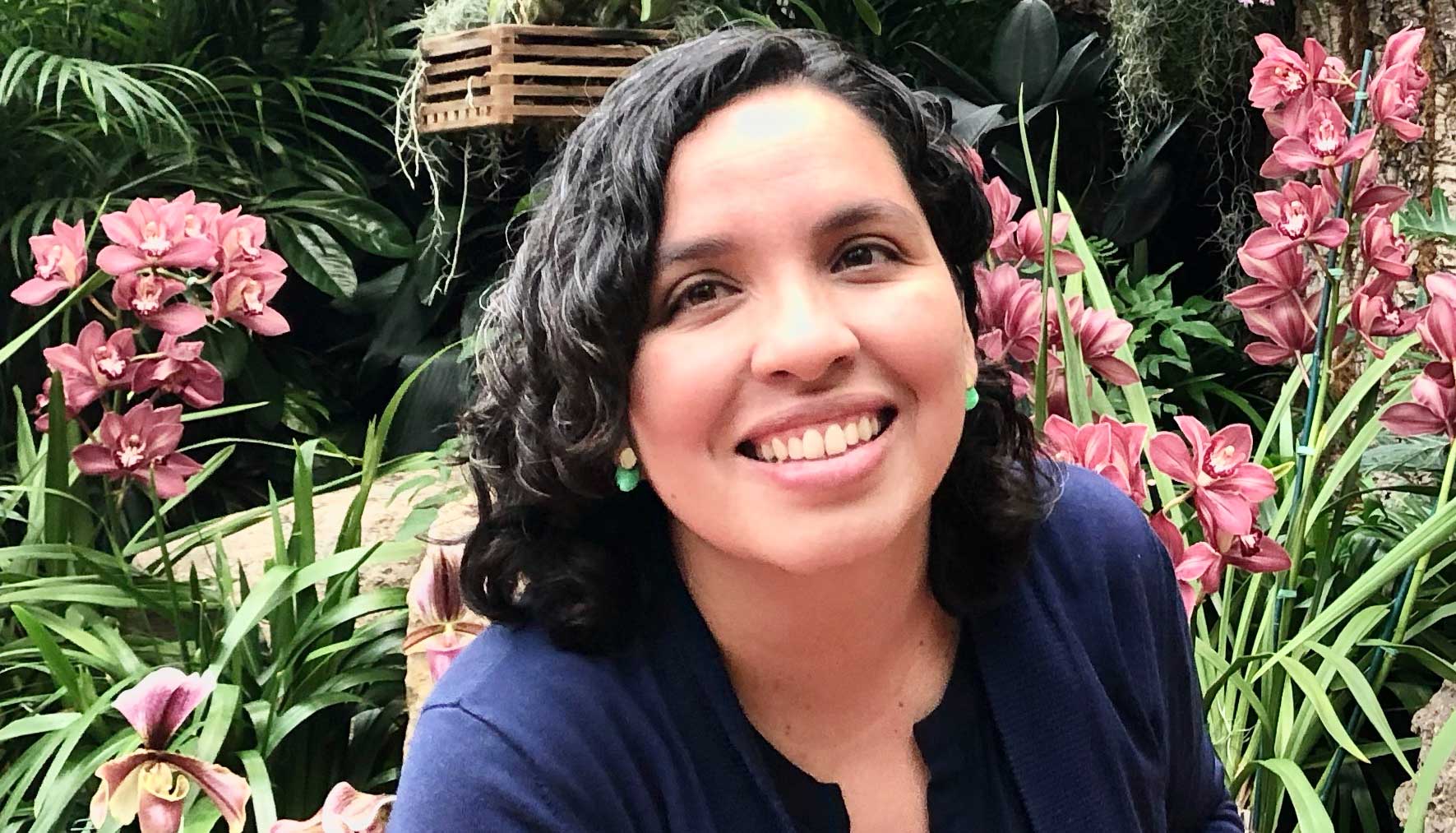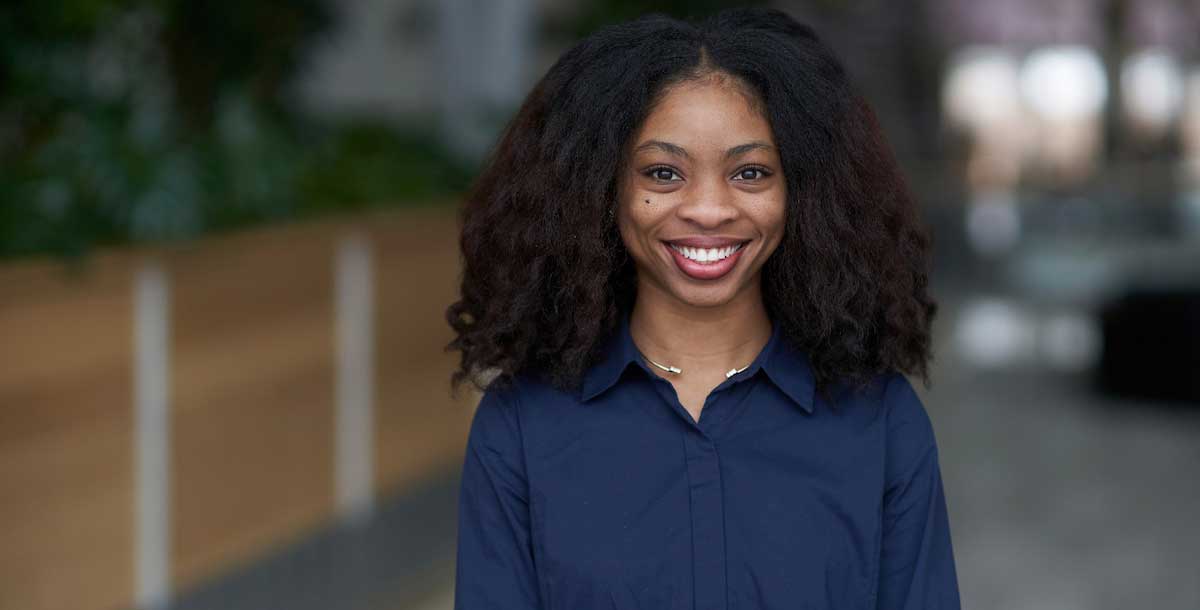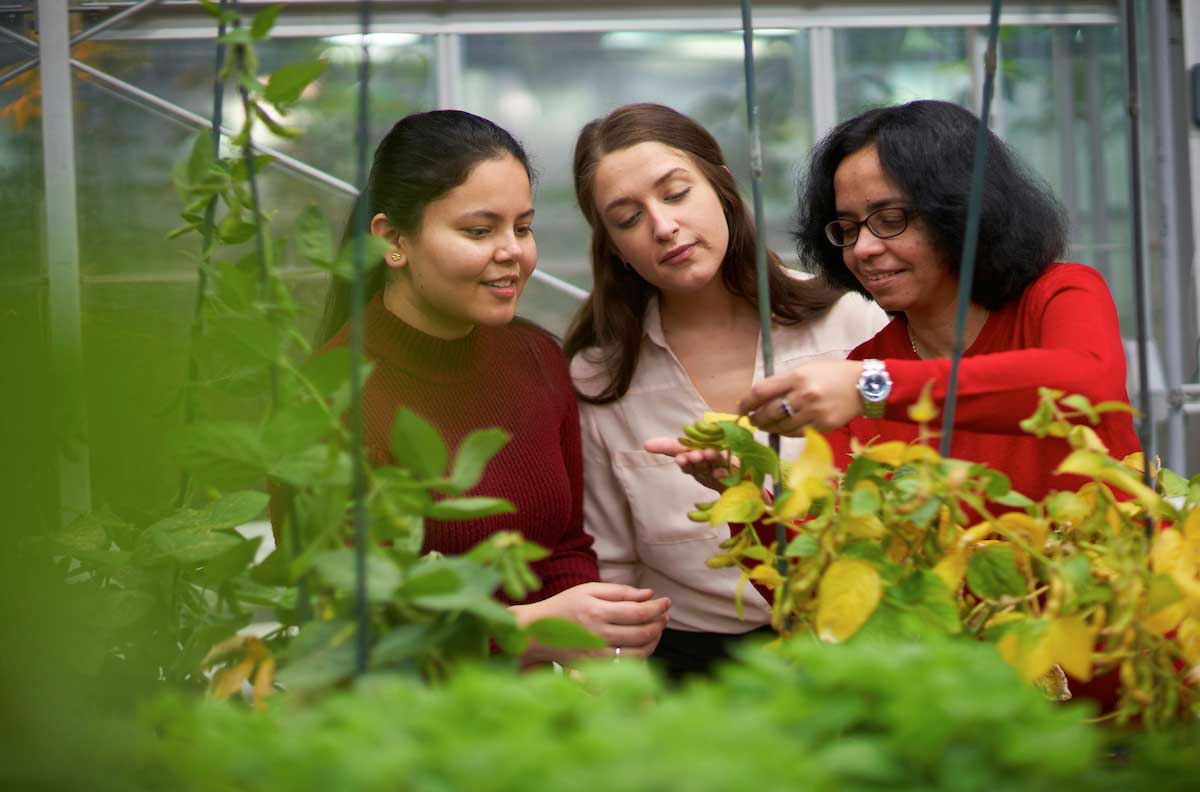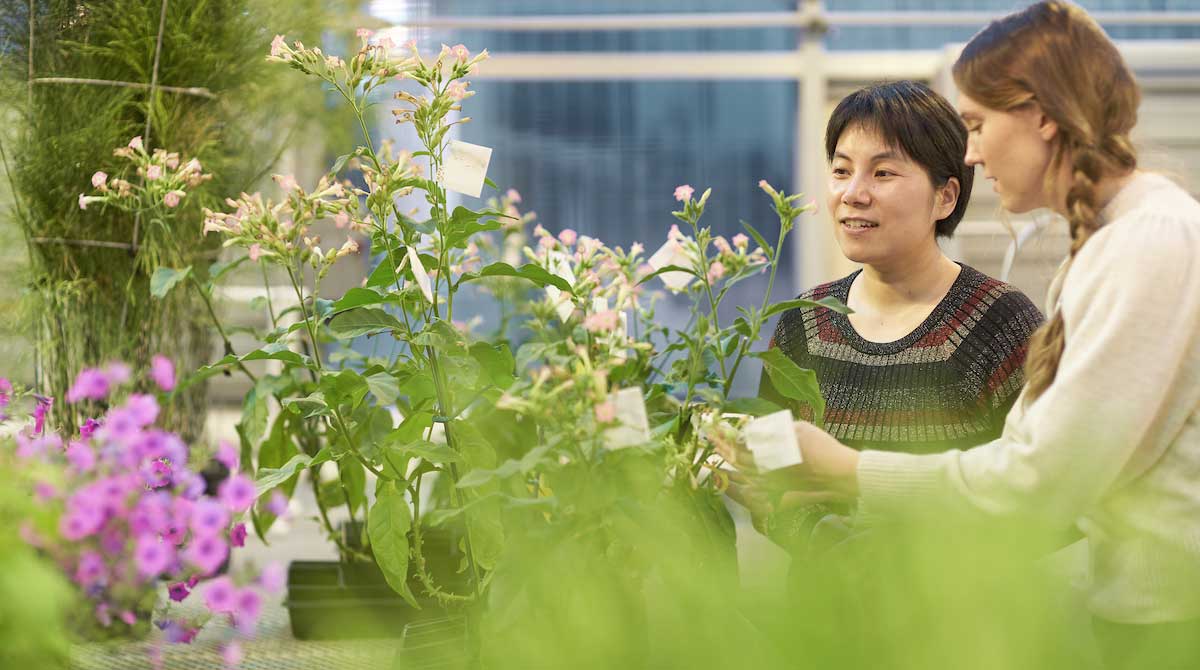Spotlight on Women in Science at the Danforth Center
In recognition of the International Day of Women and Girls in Science on February 11, we spoke to a few of many women scientists about their research focus and its impact on our mission. Meet Elizabeth Castillo, Taylor Harris, Sona Pandey, PhD, and Ru Zhang, PhD. While their research represents a wide-range of studies in plant science, they share a passion for encouraging more women to pursue careers in the sciences and their vision for a more diverse, equitable, and inclusive plant science field.

Elizabeth Castillo
Elizabeth Castillo, Administrative Laboratory Manager in Malia Gehan’s lab, has developed a new protocol for quinoa in vitro pollen germination, which she is using to study how heat affects quinoa pollen germination. “Heat reduces the grain yield of quinoa by nearly 80%, and quinoa needs viable pollen to produce grain, so we want to see how much pollen is affected by heat,” explains Elizabeth. “Reduced pollen viability could help explain the grain yield loss we see from heat stress in quinoa.”
What inspired you to become a scientist?
My mom inspired me. As a school teacher she always motivated me. She said, “You can be whatever you like, it is your choice.” That was the key, the freedom to choose. My mom grew up in a small town in the highlands of Peru and she did not have that freedom to choose. She told me about the obstacles that she had to overcome to access an education, so I was always aware that I was very lucky to have the support of my family and the opportunity to choose. I chose to follow my passion and became a plant scientist.
What advice do you have for women and girls interested in science?
Follow your dreams and believe in yourself, you can do anything you want. Following your dreams is not always a smooth journey, but working every day in a field that you love is the best reward.
How do you hope to see the plant science field change during your career?
It will be very exciting to see more opportunities for international collaborative research, especially working in plant science. I know that government regulations for transferring plant material between countries are a big hurdle. However, the centers of diversity for many crops are in economically disadvantaged countries and the best technology and resources for research are available in more economically strong countries, like the United States. We need to do a better job of helping the farmers in the centers of origin, who preserve diversity. To develop better crops, we need to explore crops’ natural variation for relevant genes, so access to that natural diversity is as important as access to the resources to study it.

Taylor Harris
As a graduate student in Rebecca Bart’s lab, Taylor Harris studies interactions between plants and bacteria. Currently, she is studying if and how two bacterial pathogens work together to cause disease in cotton. “We usually consider plant diseases in the context of one pathogen, so exploring how pathogens can collaborate to cause infection is super interesting to me,” explains Taylor.
What inspired you to become a scientist?
I honestly love to learn. In grade school and college, I was always “good” at science—especially biology. I knew I was interested in being a biologist of some sort so that I could always learn new things. After realizing there were not many scientists who looked like me, I made it my personal mission to also help aspiring scientists from similar backgrounds reach their goals and feel confident that they belong in science too.
What advice do you have for women and girls interested in science
Don’t be afraid to do you. In other words, if science is your thing, go for it! So many women have already made it more welcoming and possible for us to be in the scientific space. We should let our passion for science drive us toward and beyond the lane they’ve carved out for us!
How do you hope to see the plant science field change during your career?
I want to see the plant science field continue toward making the space more equitable and inclusive of people from different backgrounds. Progress is being made on this every day. As long as we keep that equity-minded lens at the forefront of our engagements with both the broader and scientific community, we can reach a space where the field’s research discoveries, impact, and opportunities are representative of and available for everyone.

From left to right: Dr. Nikita Bhatnagar, Postdoctoral Associate, Audrey Dodds, Research Technician, and Dr. Sona Pandey
Sona Pandey
Sona Pandey, PhD, is a Principal Investigator and Member at the Danforth Center. Her lab wants to understand how plants sense their environment, and then what physiological, molecular and developmental changes take place to adapt to that environment. “Once we understand how plants respond to such changes, we can modify these responses to fulfil our future needs,” explains Sona. “One of my favorite quotes is: ‘Know plants: Know life; No plants, no life!’” Sona also leads the Danforth Center’s Research Experience for Undergraduates program, a summer internship program that immerses students in a rich research environment that lays the foundation for a career in plant science.
What inspired you to become a scientist?
There were many little instances that inspired me, but I think the underlying cause was my parents, especially my mother’s enthusiasm and encouragement, and a few extraordinary teachers who made it effortless and fun to study science. Once I was in high school, I knew this is what I wanted to do. In graduate school, I had an amazing advisor who helped me understand how to approach an interesting scientific question and what it really takes to be a scientist.
What advice do you have for women and girls interested in science?
Never let anyone make you believe that science is not for girls or women; that science is not fun, or that science is too hard. Be curious and ask questions. If you have any doubts about your abilities because you are a girl or woman, read about other women scientists. Those who came before you made it under relatively difficult social norms. You can do it too!
How do you hope to see the plant science field change during your career?
Scientifically, I would love to see the discoveries being made in the lab now make it to the farmers’ field, and I would love to see us be able to grow healthier food more sustainably. I hope for better exchange of ideas and resources to countries that need it the most. In addition, I hope the plant science field sets an example for equity, diversity and inclusivity for other disciplines to follow.

From left to right: Dr. Ru Zhang, and Cheyenne Anderson, Lab Technician
Ru Zhang
Meet Ru Zhang, PhD, Assistant Member at the Danforth Center. Ru and her lab study how photosynthetic cells respond to high temperatures by using both green algae and land plants as models. “Photosynthesis uses sunlight energy to make food, and it is essential for agricultural production,” explains Ru. “However, photosynthesis is one of the most heat sensitive processes in plants. To meet the increasing global food demand for the future, we need to increase agricultural yield by engineering more robust and more efficient photosynthesis that can adapt to high temperatures.” Ru is also a co-PI of the Danforth Center’s Research Experience for Undergraduates program, a summer internship program that immerses undergraduate students in a rich research environment that lays the foundation for a career in plant science.
What inspired you to become a scientist?
During a class in my elementary school in a small village, my teacher said to us, "One of you in this classroom will become a scientist in the future." I could not help thinking, "Could that person be me?" In college, I found myself to be very curious about the scientific knowledge I learned and liked to ask "why" questions. My motivation, interest, and personality naturally led me to a scientific career. I also had great mentors and outstanding colleagues who not only taught me scientific skills but also encouraged me to go further on my scientific path.
What advice do you have for women and girls interested in science
There are many excellent female scientists who contributed significantly to science. Take some of them as your role models and tell yourself, "If they can be successful female scientists, I could do it as well!" When you have unfair treatment or even discrimination for being a woman in science, it is normal to be upset, but quickly convert that unhappiness into motivation for being better and stronger. Let your accomplishments speak for you and demonstrate your excellence in science.
How do you hope to see the plant science field change during your career?
I hope to see more female scientists leading research directions and/or initiating new research areas, and more female students having high quality education and training in science. I hope to see more interaction between scientists and farmers so scientists in the laboratories can work directly with farmers in the field to improve crop productivity. I also hope to see more non-science people become interested in plant science and understand the importance of plant science in improving human living conditions.